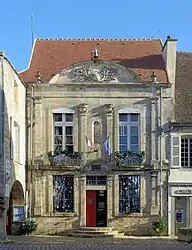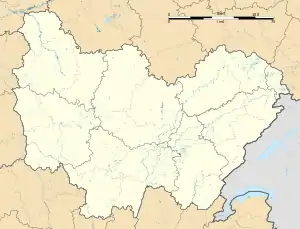Noyers | |
|---|---|
 The town hall in Noyers | |
 Coat of arms | |
Location of Noyers | |
 Noyers  Noyers | |
| Coordinates: 47°41′51″N 3°59′41″E / 47.6975°N 3.9947°E | |
| Country | France |
| Region | Bourgogne-Franche-Comté |
| Department | Yonne |
| Arrondissement | Avallon |
| Canton | Chablis |
| Government | |
| • Mayor (2020–2026) | Nathalie Labosse[1] |
| Area 1 | 35.66 km2 (13.77 sq mi) |
| Population | 588 |
| • Density | 16/km2 (43/sq mi) |
| Time zone | UTC+01:00 (CET) |
| • Summer (DST) | UTC+02:00 (CEST) |
| INSEE/Postal code | 89279 /89310 |
| Elevation | 167–296 m (548–971 ft) (avg. 189 m or 620 ft) |
| 1 French Land Register data, which excludes lakes, ponds, glaciers > 1 km2 (0.386 sq mi or 247 acres) and river estuaries. | |
Noyers (French pronunciation: [nwajɛʁ]; often referred to as Noyers-sur-Serein) is a commune in the Yonne department in Bourgogne-Franche-Comté in north-central France.
There are half-timbered houses, ashlars, pillars and pinnacles. There are many cobbled lanes and small squares made of chalky and granitic pavements. There are towers surrounded by the river Serein loops. It has retained much of its medieval appearance with many buildings dating from the 16th century, and is a tourist destination with several restaurants, art galleries, a pottery and a museum. The centre is pedestrianised on Saturdays and Sundays in summer. The village also holds two large truffle fairs in November where locally picked fresh truffles are sold to buyers from throughout France and beyond.
History
The origins of Noyers are unclear. It was founded by the king of Sequani Gaul tribe, just before the Roman conquest, or by a contemporary of Julius Caesar called Lucidorius. He would have given the city its first name, Lucida.
Around and after the 12th century the city became the seat of the Miles family. At the end of the twelfth century, Hugues de Noyers, bishop of Auxerre, built "one of the most famous castles of France". It was beleaguered by Blanche of Navarre's troops in 1217, but it did resist.
In 1419, at the end of the Miles dynasty, Noyers became the property of the dukes of Burgundy. The prince of Condé became count of Noyers. He made a Huguenot place of the city and took refuge in it after the defeat of the Amboise conspiracy in 1568. But Catherine de Médicis dislodged him and the garrison surrendered.
Later the castle was dismantled by King Henry IV in 1599. After a long time of lethargy the city revived in 1710 when the duke of Luynes married the last descendant of the Condé family.
Wine and grain trade were prosperous at Noyers. Many documents attest there were plenty of vines, walnut-trees and cherry-trees over the hills all around Noyers. Till the beginning of the twentieth century a great part of local craftsmen was represented by cartwrights, harness-makers, coopers, farriers and shoe makers. In 1861 there were 128 vine-growers and 25 tillage-farmers. As of the 21st century, they are not as many farmers.
On December 7, 1983, Duran Duran filmed the music video for their single New Moon On Monday within the city walls after dark. The town's historic streets have also been featured in several other films and TV series.
Twin towns
 Noceto, Italy
Noceto, Italy
See also
References
- ↑ "Répertoire national des élus: les maires" (in French). data.gouv.fr, Plateforme ouverte des données publiques françaises. 13 September 2022.
- ↑ "Populations légales 2021". The National Institute of Statistics and Economic Studies. 28 December 2023.
External links